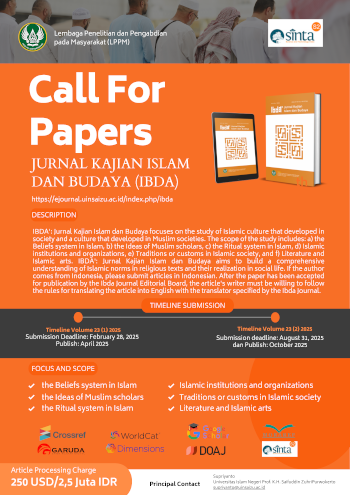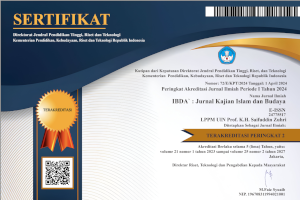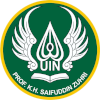INTELLECTUAL RELIGIOSITY OF ISLAMIC BOARDING SCHOOL IN A. MUSTOFA BISRI’S POETRY
DOI:
https://doi.org/10.24090/ibda.v15i2.1103Kata Kunci:
A. Mustofa Bisri, Pesantren, Puisi, DakwahAbstrak
This paper seeks to uncover A. Mustofa Bisri as a literary writer who “departs from Islamic boarding school†which conveys intellectual religiosity through poetry. The concept of thinking used in this paper by exposing poetry as text, the world of Islamic boarding school as a con- text, and the interrelations both in poetry and religious Islamic intellectu- als as contextualization. First, the intensity of the written poetry is based on the intellectualreligiosity in theIslamicboarding school, so it is reli- giously timeless, and beyond the limitations of language usage. Aspects of events, aspects of experience, and aspects of the view of life (weltan- schauung) unite in the particular language and culture. Secondly, the prin- ciple that the idiocencracy of religious poetry based on Islamic values in the form of a poetical language is important to mark one’s poet as the context of the poetical of A. Mustofa Bisri. It should be interpreted not only as a symptom of poetical language that breaks away from the mean- ing of poetry (the religious experience expressed and simultaneously dis- played in poetry), but also the dynamics interrelated between poets, po- ems, and cultural backgrounds that surround them. Third, the religious experience manifested in the language of poetry is the deepestform of religious intellectual abstraction, i.e., divined and cherished love. This condition is shaped by the crystallization of knowledge as an action in the deepest dimension of one’s humanity to voice inner perceptions. By loving God, people will love God’s creation, man and the universe, as he loves himself. By loving each other and the universe as God’s creation, a lover will treat himself as a person of faith and do good deeds, and remind each other to hold fast to the truth, and remind each other to be patient. The concept cannot be separated from the perspective of al-Qur’an and al-Hadith.Unduhan
Data unduhan belum tersedia.
Referensi
Al-Qur’an dan Terjemahannya. Jakarta: Proyek Pengadaan Kitab Suci Al-Qur’an Departemen Agama RI., 1983/1984.
Al-Ghazali. 1996. Al-Asma’ al-Husna: Rahasia Nama-nama Indah Allah. Terj. Ilyas Hasan. Bandung: Mizan, Cet. III.
Al-Hujwiri, Ibnu Usman. 2003. Kasyf al-Mahjub (Menyelami Samudera Tasawuf). Terj. Ahmad Afandi. Yogyakarta: Pustaka Sufi.
Al-Qadir Jilani, Syekh Abd. 2006. The Secret of Secrets (Menyingkap Tabir Rahasia Ilahi Syekh Abd al-Qadir Jilani). Terj. Mudhofir Abdullah. Yogyakarta: Suluh Press.
Arabi, Ibn. 2004. Fusus al-Hikam, terj. Ahmad Sahidah dan Nurjannah Arianti. Yogyakarta: Pustaka Sufi.
Bachri, Sutardji Calzoum.1981. O, Amuk, Kapak. Jakarta: Sinar Harapan.
Bisri, A. Mustofa. 1990. Ohoi (Kumpulan Puisi-puisi Balsem). Jakarta: Pustaka Firdaus.
________ . 1995. Rubayat Angin dan Rumput. Jakarta: Majalah Humor dan PT. Matra Multi Media, Cet.II.
________ . 1996. Wekwekwek (Sajak-sajak Bumi Langit). Surabaya: Risalah Gusti.
________ . 1997. Keindahan Tak Terbendung... Jakarta: Rumah Dongeng Indonesia.
________ . 2000. Sajak-sajak Cinta Gandrung. Rembang : Al-Ibris.
________ . 2002. Negeri Daging. Yogyakarta: Bentang.
________ . 2003. Tadarus . Yogyakarta: Adicita Karya Nusa, Cet.II.
________ . 2004. Mutiara-mutiara Benjol. Surabaya: Mata Air Publishing.
________ . 2005. Pahlawan dan Tikus. Yogyakarta: Hikayat, Cet. II.
Burckhardt, Titus. 1976. Mengenal Ajaran Kaum Sufi. Terj. Azyumardi Azra. Jakarta: Pustaka Jaya.
Chirzin, Muhammad. 2003. Glosari al-Qur’an. Yogyakarta: Lazuardi.
Chittick, William C. 2000. Jalan Cinta Sang Sufi: Ajaran-ajaran Spiritual Rumi. Yogyakarta: Qalam, Cet. I.
_________ . 2001. Hermeneutika al-Qur’an Ibnu al-“Araby. Yogyakarta: Qalam.
_________ . 2002. Tasawuf di Mata Kaum Sufi. Bandung : Mizan.
Damono, Sapardi Djoko. 1999. Sihir Rendra: Permainan Makna. Jakarta: Pustaka Firdaus.
Hadi W.M., Abdul. (Ed.). 1985. Sastra Sufi. Jakarta: Pustaka Firdaus.
________ . (Ed.). 1985. Rumi Sufi dan Penyair. Bandung: Penerbit Pustaka.
________ . 1995. Hamzah Fansuri: Risalah Tasawuf dan Puisi-puisinya. Bandung: Mizan.
________ . 1999. Kembali ke Akar Kembali ke Sumber. Jakarta: Pustaka Firdaus.
________ . 2000. Islam Cakrawala Estetik dan Budaya. Jakarta: Pustaka Firdaus.
________ . 2001. Tasawuf yang Tertindas. Jakarta: Paramadina.
________ . 2004. Hermeneutika, Estetika, dan Religiusitas. Yogyakarta: Mahatari.
Hamka. 1984. Tasawuf Perkembangan dan Pemurniannya. Jakarta : Pustaka Panjimas.
________ . 1990. Tasawuf Modern. Jakarta: Pustaka Panjimas.
Iqbal, Muhammad. 1982. Membangun Kembali Pikiran Agama dalam Islam. Terj. Ali Audah, dkk. Jakarta: Tintamas.
James, William. 1984. The Varieties of Religious Experience. New York: Collier Macmillan Publishers.
Mangunwijaya, Y.B. 1988. Sastra dan Religiositas. Yogyakarta: Kanisius.
Murata, Sachiko. 1996. The Tao of Islam. Bandung: Mizan.
_________ & William C. Chittick. 2005. The Vision of Islam, Terj. Suharsono. Yogyakarta: Suluh Press.
Nadjib, Emha Ainun. 1983. 99 untuk Tuhanku. Bandung: Penerbit Pustaka.
Nicholson, R.A. 2003. Tasawuf Cinta (Studi atas Tiga Sufi; Ibn Abi al-Khair, al-Jili, dan Ibn al-Faridh). Bandung: Mizan.
Schimmel, Annemarie. 1993. Akulah Angin Engkaulah Api. Bandung: Mizan.
_________ .1996. Rahasia Wajah Suci Ilahi. Bandung : Mizan.
_________ . 2003-a. Dimensi Mistik dalam Islam, cet. II. Jakarta: Pustaka Firdaus.
_________ . 2003-b. Sayap-sayap Jibril : Gagasan Religius Muhammad Iqbal. Yogyakarta: Lazuardi.
_________ . 2005. Menyingkap Yang-Tersembunyi , terj. Saini K.M. Bandung: Mizan, Cet. I.
Al-Ghazali. 1996. Al-Asma’ al-Husna: Rahasia Nama-nama Indah Allah. Terj. Ilyas Hasan. Bandung: Mizan, Cet. III.
Al-Hujwiri, Ibnu Usman. 2003. Kasyf al-Mahjub (Menyelami Samudera Tasawuf). Terj. Ahmad Afandi. Yogyakarta: Pustaka Sufi.
Al-Qadir Jilani, Syekh Abd. 2006. The Secret of Secrets (Menyingkap Tabir Rahasia Ilahi Syekh Abd al-Qadir Jilani). Terj. Mudhofir Abdullah. Yogyakarta: Suluh Press.
Arabi, Ibn. 2004. Fusus al-Hikam, terj. Ahmad Sahidah dan Nurjannah Arianti. Yogyakarta: Pustaka Sufi.
Bachri, Sutardji Calzoum.1981. O, Amuk, Kapak. Jakarta: Sinar Harapan.
Bisri, A. Mustofa. 1990. Ohoi (Kumpulan Puisi-puisi Balsem). Jakarta: Pustaka Firdaus.
________ . 1995. Rubayat Angin dan Rumput. Jakarta: Majalah Humor dan PT. Matra Multi Media, Cet.II.
________ . 1996. Wekwekwek (Sajak-sajak Bumi Langit). Surabaya: Risalah Gusti.
________ . 1997. Keindahan Tak Terbendung... Jakarta: Rumah Dongeng Indonesia.
________ . 2000. Sajak-sajak Cinta Gandrung. Rembang : Al-Ibris.
________ . 2002. Negeri Daging. Yogyakarta: Bentang.
________ . 2003. Tadarus . Yogyakarta: Adicita Karya Nusa, Cet.II.
________ . 2004. Mutiara-mutiara Benjol. Surabaya: Mata Air Publishing.
________ . 2005. Pahlawan dan Tikus. Yogyakarta: Hikayat, Cet. II.
Burckhardt, Titus. 1976. Mengenal Ajaran Kaum Sufi. Terj. Azyumardi Azra. Jakarta: Pustaka Jaya.
Chirzin, Muhammad. 2003. Glosari al-Qur’an. Yogyakarta: Lazuardi.
Chittick, William C. 2000. Jalan Cinta Sang Sufi: Ajaran-ajaran Spiritual Rumi. Yogyakarta: Qalam, Cet. I.
_________ . 2001. Hermeneutika al-Qur’an Ibnu al-“Araby. Yogyakarta: Qalam.
_________ . 2002. Tasawuf di Mata Kaum Sufi. Bandung : Mizan.
Damono, Sapardi Djoko. 1999. Sihir Rendra: Permainan Makna. Jakarta: Pustaka Firdaus.
Hadi W.M., Abdul. (Ed.). 1985. Sastra Sufi. Jakarta: Pustaka Firdaus.
________ . (Ed.). 1985. Rumi Sufi dan Penyair. Bandung: Penerbit Pustaka.
________ . 1995. Hamzah Fansuri: Risalah Tasawuf dan Puisi-puisinya. Bandung: Mizan.
________ . 1999. Kembali ke Akar Kembali ke Sumber. Jakarta: Pustaka Firdaus.
________ . 2000. Islam Cakrawala Estetik dan Budaya. Jakarta: Pustaka Firdaus.
________ . 2001. Tasawuf yang Tertindas. Jakarta: Paramadina.
________ . 2004. Hermeneutika, Estetika, dan Religiusitas. Yogyakarta: Mahatari.
Hamka. 1984. Tasawuf Perkembangan dan Pemurniannya. Jakarta : Pustaka Panjimas.
________ . 1990. Tasawuf Modern. Jakarta: Pustaka Panjimas.
Iqbal, Muhammad. 1982. Membangun Kembali Pikiran Agama dalam Islam. Terj. Ali Audah, dkk. Jakarta: Tintamas.
James, William. 1984. The Varieties of Religious Experience. New York: Collier Macmillan Publishers.
Mangunwijaya, Y.B. 1988. Sastra dan Religiositas. Yogyakarta: Kanisius.
Murata, Sachiko. 1996. The Tao of Islam. Bandung: Mizan.
_________ & William C. Chittick. 2005. The Vision of Islam, Terj. Suharsono. Yogyakarta: Suluh Press.
Nadjib, Emha Ainun. 1983. 99 untuk Tuhanku. Bandung: Penerbit Pustaka.
Nicholson, R.A. 2003. Tasawuf Cinta (Studi atas Tiga Sufi; Ibn Abi al-Khair, al-Jili, dan Ibn al-Faridh). Bandung: Mizan.
Schimmel, Annemarie. 1993. Akulah Angin Engkaulah Api. Bandung: Mizan.
_________ .1996. Rahasia Wajah Suci Ilahi. Bandung : Mizan.
_________ . 2003-a. Dimensi Mistik dalam Islam, cet. II. Jakarta: Pustaka Firdaus.
_________ . 2003-b. Sayap-sayap Jibril : Gagasan Religius Muhammad Iqbal. Yogyakarta: Lazuardi.
_________ . 2005. Menyingkap Yang-Tersembunyi , terj. Saini K.M. Bandung: Mizan, Cet. I.
Unduhan
Diterbitkan
2017-11-30
Cara Mengutip
Wachid B.S., A., Waluyo, H. J., Pradopo, R. D., & Suyitno, S. (2017). INTELLECTUAL RELIGIOSITY OF ISLAMIC BOARDING SCHOOL IN A. MUSTOFA BISRI’S POETRY. IBDA` : Jurnal Kajian Islam Dan Budaya, 15(2), 325–345. https://doi.org/10.24090/ibda.v15i2.1103
Terbitan
Bagian
Articles
Lisensi
Authors who publish with this journal agree to the following terms:
- Authors retain copyright and grant the journal right of first publication with the work simultaneously licensed under a Creative Commons Attribution-ShareAlike License a that allows others to share the work with an acknowledgement of the work's authorship and initial publication in this journal.
- Authors are able to enter into separate, additional contractual arrangements for the non-exclusive distribution of the journal's published version of the work (e.g., post it to an institutional repository or publish it in a book), with an acknowledgment of its initial publication in this journal.
- Authors are permitted and encouraged to post their work online (e.g., in institutional repositories or on their website) before and during the submission process, as it can lead to productive exchanges, as well as earlier and greater citation of published work (See The Effect of Open Access).
















